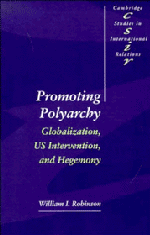Book contents
- Frontmatter
- Contents
- Acknowledgments
- List of acronyms and abbreviations
- Introduction. From East–West to North–South: US intervention in the “new world order”
- 1 From “straight power concepts” to “persuasion” in US foreign policy
- 2 Political operations in US foreign policy
- 3 The Philippines: “Molded in the image of American democracy”
- 4 Chile: Ironing out “a fluke of the political system”
- 5 Nicaragua: From low-intensity warfare to low-intensity democracy
- 6 Haiti: The “practically insolvable problem” of establishing consensual domination
- 7 Conclusions: The future of polyarchy and global society
- Notes
- Select bibliography
- Index
- CAMBRIDGE STUDIES IN INTERNATIONAL RELATIONS
7 - Conclusions: The future of polyarchy and global society
Published online by Cambridge University Press: 05 July 2011
- Frontmatter
- Contents
- Acknowledgments
- List of acronyms and abbreviations
- Introduction. From East–West to North–South: US intervention in the “new world order”
- 1 From “straight power concepts” to “persuasion” in US foreign policy
- 2 Political operations in US foreign policy
- 3 The Philippines: “Molded in the image of American democracy”
- 4 Chile: Ironing out “a fluke of the political system”
- 5 Nicaragua: From low-intensity warfare to low-intensity democracy
- 6 Haiti: The “practically insolvable problem” of establishing consensual domination
- 7 Conclusions: The future of polyarchy and global society
- Notes
- Select bibliography
- Index
- CAMBRIDGE STUDIES IN INTERNATIONAL RELATIONS
Summary
Most people in the world put up with very great inequalities, but when these inequalities appear to be increasing without prospect of being reversed and when they mean famine, epidemic, and certain death for millions of people, they cease to be merely aesthetic problems and acquire the status of political crises.
Richard Barnet and Ronald MullerThe world of humankind constitutes a manifold, a totality of interconnected processes, and inquiries that disassemble this totality into bits and then fail to reassemble it falsify reality. Concepts like “nation,” “society,” and “culture” name bits and threaten to turn names into things. Only by understanding these names as bundles of relationships, and by placing them back into the field from which they were abstracted, can we hope to avoid misleading inferences and increase our share of understanding.
Eric WolfThe present study, as stated in the introduction, has a dual purpose. The first was to analyze and explain the promotion of polyarchy in US foreign policy. The second, more open-ended, was to explore political and social dimensions of globalization. This concluding chapter is divided into two parts. In the first part, I recapitulate my main thesis, take a brief look at “democracy promotion” programs in the former Soviet bloc and South Africa and US activities world wide so as to strengthen generalizing conclusions, and summarize in comparative perspective the case studies.
- Type
- Chapter
- Information
- Promoting PolyarchyGlobalization, US Intervention, and Hegemony, pp. 317 - 385Publisher: Cambridge University PressPrint publication year: 1996



